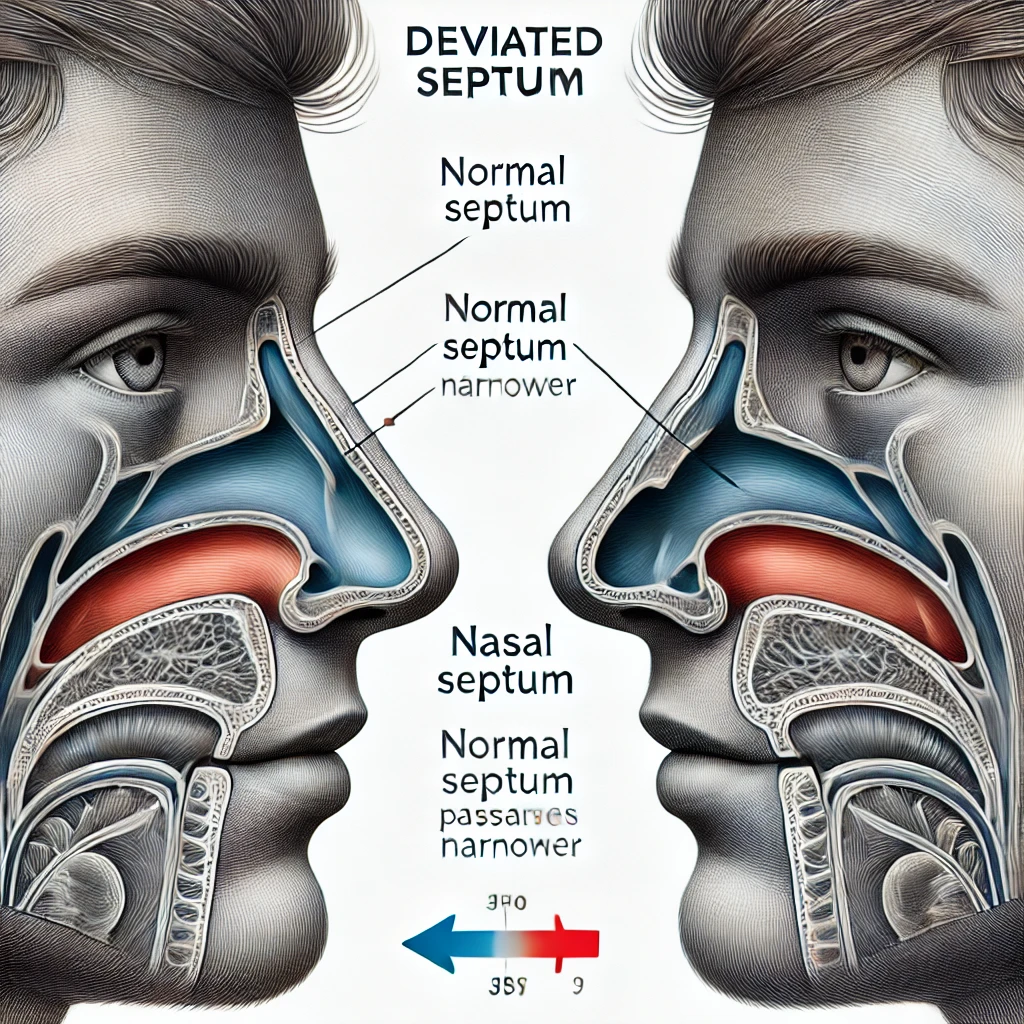How To Fix Deviated Septum Without Surgery:-A deviated septum refers to a condition in which the nasal septum, the cartilage and bone that separates the two nostrils, is off-center or crooked. This deviation can lead to breathing difficulties, nasal congestion, and other health problems. Understanding the causes, symptoms, and treatment options is vital for those affected by this condition.

What is a Deviated Septum:-
The nasal septum is a structure that divides the nasal cavity into two halves. Ideally, it should be located in the center of the nose, creating two equal air passages. When this structure is displaced or bent, it is called a deviated septum. In some individuals, the deviation is mild and doesn’t cause noticeable issues. However, in others, it can be severe, leading to breathing problems and other complications.
Causes of Deviated Septum:-
A deviated septum can occur due to various reasons, including:
1. Congenital Defects: Some individuals are born with a deviated septum. This can result from the way the nasal passages form during fetal development.
2. Injury or Trauma: Accidents, sports injuries, or any trauma to the nose can result in the displacement of the septum. A broken nose or direct blow to the face may push the septum out of place.
3. Aging: As people age, the cartilage in the nose may become weaker or shift, causing the septum to deviate over time.
4. Chronic Nasal Infections: Frequent sinus infections and inflammation can cause the nasal tissues to swell, which can worsen a slightly deviated septum.
Symptoms of a Deviated Septum:-
The symptoms of a deviated septum can range from mild to severe and include:
1. Breathing Difficulty: One of the most common signs of a deviated septum is difficulty breathing through one or both nostrils. The obstruction can make it harder to get enough air through the nose.
2. Nasal Congestion: Individuals with a deviated septum often experience chronic nasal congestion, especially on one side of the nose.
3. Frequent Nosebleeds: The irregular airflow caused by a deviated septum can dry out the nasal passages, leading to frequent nosebleeds.
4. Sinus Infections: Blocked nasal passages can trap mucus, increasing the likelihood of bacterial growth and recurring sinus infections.
5. Snoring or Sleep Apnea: A deviated septum can contribute to noisy breathing, snoring, and even sleep apnea, a condition in which breathing repeatedly stops and starts during sleep.
6. Facial Pain or Headaches: Chronic sinus pressure or blockages may cause facial pain or headaches, especially around the eyes, nose, and forehead.
Diagnosis of a Deviated Septum:-
To diagnose a deviated septum, a healthcare provider will perform a physical examination of the nose, often using a nasal speculum to look inside the nostrils. Imaging tests such as X-rays or CT scans are rarely necessary but may be used to assess the extent of the deviation in severe cases.
Treatment Options for a Deviated Septum:-
There are several treatment options for a deviated septum, depending on the severity of the symptoms and how much they interfere with daily life.
1. Medication: For mild cases, medications can help manage the symptoms associated with a deviated septum. Common medications include:
- Nasal Steroids: These reduce inflammation in the nasal passages, improving airflow and reducing congestion.
- Decongestants: These can help shrink the swollen tissues in the nose, but they should not be used long-term due to the risk of rebound congestion.
- Antihistamines: If allergies contribute to nasal congestion, antihistamines can be effective in reducing symptoms.
2. Surgery (Septoplasty): In cases where medication doesn’t alleviate symptoms, septoplasty, a surgical procedure to correct the deviation, may be necessary. During septoplasty, the surgeon repositions the septum to the center of the nose. This procedure is usually performed under general anesthesia and takes about 1 to 2 hours. The recovery time is typically one to two weeks, during which patients may experience swelling, bruising, and nasal congestion.
Benefits of Septoplasty:-
- Improved breathing
- Reduced nasal congestion
- Better sleep quality
- Fewer sinus infections
- Enhanced quality of life
Risks of Septoplasty:
- Bleeding or infection
- Scarring inside the nose
- Continued nasal obstruction if the septum shifts again
- A change in the shape of the nose
3. Rhinoplasty: In some cases, patients may opt to undergo a combination of septoplasty and rhinoplasty, a cosmetic surgery to reshape the nose. This procedure is known as a septorhinoplasty and can address both functional and aesthetic concerns.
Home Remedies for Managing Symptoms:-
While surgery is often the only way to permanently correct a deviated septum, some home remedies can help manage mild symptoms.
1. Saline Nasal Sprays: Using a saline spray helps keep the nasal passages moist and prevents dryness and irritation, which can worsen symptoms.
2. Humidifiers: Adding moisture to the air with a humidifier can alleviate nasal congestion and make breathing easier.
3. Sleeping Position: Sleeping on your side or elevating your head with pillows can reduce nasal obstruction and improve airflow during sleep.
4. Avoiding Irritants: Smoke, strong odors, and allergens can worsen nasal congestion. Avoiding these triggers can help reduce symptoms.
How To Fix Deviated Septum Without Surgery
While some causes of a deviated septum, like congenital defects, cannot be prevented, there are steps to reduce the risk of worsening symptoms or further damage:
1. Avoid Trauma: Use protective gear during sports, and be cautious to avoid facial injuries that could affect the septum.
2. Manage Allergies: Keeping allergies under control through medications or environmental adjustments can prevent swelling in the nasal passages.
3. Regular Nasal Hygiene: Using saline rinses or sprays regularly can help keep nasal passages clear and reduce inflammation.
READ MORE- How To Fix A Crooked Nose Without Surgery
Conclusion:-
A deviated septum is a common condition that can significantly impact an individual’s quality of life, especially if it causes breathing problems, nasal congestion, and recurrent infections. While medications may offer temporary relief, surgery is often the most effective way to correct the issue. If you suspect you have a deviated septum, consult with a healthcare provider to discuss the best treatment options for your situation.
